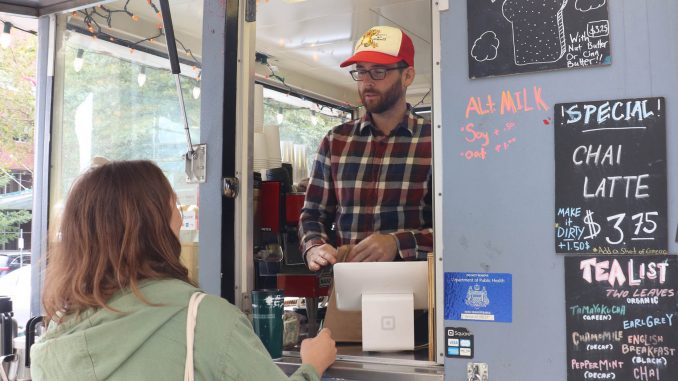
Environmental awareness has been ingrained in Matthew Craig since “day one.”
Hailing from Portland, Oregon, where eco-consciousness is “embedded in the culture,” Craig, a Temple 2012 MFA alumnus, said he was shocked by the amount of litter when he first came to Philadelphia.
“There shouldn’t be an ounce of your persona where you’re like ‘[littering] is OK,’” said Craig, also a former foundation drawing instructor at the Tyler School of Art and Architecture.
In 2013, Craig and co-owner Kristen Mills opened Cloud Coffee, a coffee stand on Norris Street near 12th, where they encourage sustainability efforts as a priority in their business.
Craig said he believes a business owner should be a “responsible adult,” and factor how producing waste in vast quantities — like the estimated 350 cups and lids a day at Cloud — affects the environment.
Natalie Hilburg, a 2018 environmental studies alumna, is Cloud’s sustainability coordinator. She has a lead role in any sustainability-related changes and efforts. Before any decisions are made, Cloud’s team asks for her opinion first.
“At the beginning of each semester, we take a look at our overall waste and where we’re at in terms of sustainability and recycling. We all think about what we can be doing better,” Hilburg said.
Blind Tiger Coffee, the truck’s coffee provider located in Kensington, follows fair trade and sustainable practices, Hilburg said. The roasters Cloud has worked with in the past have “good relationships with their growers” and manage their land by thinking about their future, Craig said.
“All you see is stuff about ice caps melting and waste and a lack of resources,” he added. “I don’t know how anyone at this point can be serving things in styrofoam.”
He’s noticed that other food trucks on campus seem to rely on styrofoam packaging, Craig said. Styrofoam, also known as polystyrene, is not biodegradable or recyclable. It breaks down into microscopic pieces and is easily carried to the ocean, where it’s confused as food to marine animals, according to Clean Water Action, an environmental advocacy organization.
“There’s no way as a responsible human you should ever buy styrofoam containers,” Craig said.
In order to combat its own waste and environmental impact, Cloud offers paper straws, serves food on compostable plates and encourages a “bring your own cup” initiative for customers.
Cloud has a 50-cent discount for customers that fill up their reusable containers, and while the discount is “cutting into the cost of the product,” it’s extremely worth it, Craig said.
Students often utilize the discount and profit from both the monetary and environmental benefits, Hilburg said.
“It’s the most sustainable thing you can do,” she added. “Even if we had compostable cups, it’s not as sustainable as bringing your own and reusing it.”
Olivia Lamborn, a senior community development major, packs reusable containers and cups to use at food trucks and other locations on campus. If she doesn’t bring them, she’ll “nix it and won’t even go.”
“Usually [owners] give you a look when you ask, ‘Can you put this in my container?’” Lamborn said. “When you first do it, you feel like a weirdo but after that, people get to know you. They get used to it … when people think it’s strange, I think it of as how you’re teaching someone something new about sustainability.”
By “being prepared” and always having reusable utensils on hand, students can lessen their waste production immensely, Lamborn said.
Cloud offers soy and oat milk alternatives, in addition to milk from animals, in an effort to offer more sustainable ingredients. They don’t offer almond milk because it “takes up a ton of water to produce,” Hilburg said. A single glass of almond milk uses 74 liters of water — more than the average shower, the BBC reported in February.
Cloud’s milk from animals is locally sourced from Maplehofe Dairy, a family farm in Lancaster, Pennsylvania, and Trickling Springs Creamery, a dairy supplier in Chambersburg, Pennsylvania. The two farms treat their cows with “care and compassion,” Craig said.
“I’ve seen a lot of customers, who I’ve known for years now, are starting to drink non-dairy milk and are starting to bring their own mugs,” Hilburg said.
“Reduce, reuse and recycle is in that order for a reason,” said Brianna Anderson, a freshman entrepreneurship and marketing major. “We need a lot of people doing a little bit of effort, not a couple people doing 100 percent of the effort.”
Anderson, also the sustainability representative of Morgan Hall South residence hall’s Community Council, said students want to partake in reusable efforts, especially when they’re dedicated to one business, like those who consider Cloud their favorite place to get coffee.
“At Richie’s, they always set out coffee with straws in them. And I’m like, ‘But, I don’t want a straw.’ If they even just had no straws or … paper straws. That kind of transition helps so much. I’m all for that,” Anderson added.
The next step for the coffee stand is to start composting its waste, whether it be a percentage of their weekly production or just coffee grounds. Craig said he recently started looking into private companies that offer weekly composting services.
“As a community together, if everyone’s making these small steps [for sustainability], it becomes normalized,” he added. “Maybe it’ll highlight the fact that we’re doing these things because our actions cause consequences.”



Be the first to comment